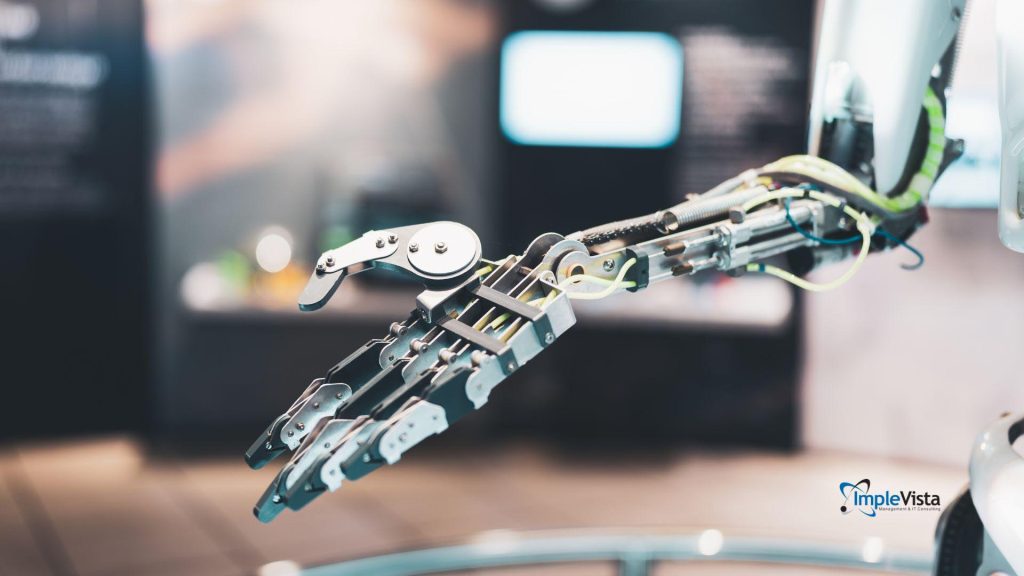Over the past few years, artificial intelligence (AI) and machine learning (ML) have become the core of most contemporary software applications. In refining user experiences to improve business processes, AI and ML merge into the fabric of how organizations regard and adopt technology and data. As an IT service provider operating in this industry, Implevista is in a position to harness these technologies to develop better, high-value, and efficient solutions for customers across many sectors.
This article explores the role artificial intelligence plays in software applications and the improvements made by machine learning in these aspects of business. It also discusses areas of application, advantages, opportunities, and threats, as well as how companies can adopt these technologies into their software landscape.
What Is Machine Learning and Artificial Intelligence In Software Solutions?
AI stands for artificial intelligence, a simulation of human thought processes used to design machines capable of learning like human beings. AI can be defined as a set of technologies, including natural language processing (NLP), cognitive computing, and robotics; it is used in different contexts, such as chatbots, Voice recognition systems, recommendation systems, etc.
In contrast, Machine Learning (ML) is a branch of AI in which algorithms are taught to recognize patterns from the data that they feed on and arrive at a conclusion based on this learning rather than following a pre-scripted set of regulations. Through constant upgrades, such models have become feasible to modify and optimize themselves without requiring humans to be involved in the process.

Transformation of MI and Artificial Intelligence In Software Solutions
1. Personalized User Experiences
One of the most significant impacts of artificial intelligence in software solutions is in the realm of personalized user experiences. AI algorithms can analyze user behaviour, preferences, and interactions to tailor content, recommendations, and services to individual needs.
For example, streaming services like Netflix and Spotify use AI and ML to analyze a user’s viewing or listening history and make personalized recommendations. This type of machine learning significantly enhances customer satisfaction by providing more relevant content, increasing engagement, and ultimately driving customer loyalty.
2. Automated Customer Support
Customer support is another area where AI and ML are making a considerable difference. AI-powered chatbots and virtual assistants are already widely used by businesses to provide round-the-clock assistance to customers.
By integrating artificial intelligence in software solutions, businesses can offer instant, reliable responses to customer inquiries, resolve issues faster, and improve overall customer satisfaction. AI’s ability to understand and process natural language enables it to handle increasingly complex queries.
According to a Gartner study, 85% of customer interactions are expected to be handled without a human agent by 2025. This highlights the increasing reliance on artificial intelligence in software solutions for automating customer support.
3. Predictive Analytics
Predictive analytics powered by machine learning enables businesses to forecast future trends, behaviours, and outcomes. ML models can predict customer behaviour, sales trends, inventory needs, and even potential system failures by analyzing historical data.
4. Fraud detection and Cybersecurity
For improving security, ML and artificial intelligence are very crucial in software solutions, especially in terms of fraud identification and cyber threat prevention. Even simple transactional and behavioural patterns can be fed as input to machine learning algorithms to quickly detect multiple potentially malicious activities.
The utilization of artificial intelligence in software solutions within sectors such as banking and finance has transformed the fraud detection system. For example, artificial intelligence can be integrated into software that scans through transactions, recognizes any irregularity, and reverses the transaction. This is useful for enterprises as it ensures that they can safely store sensitive data while at the same time creating trust with clients.
5. Intelligent Automation
It is the act of combining Artificial Intelligence with robotic process automation to improve the efficiency of repetitive tasks and decision-making. Today, much artificial intelligence in software solutions can automate various processes, including the most important administrative ones, thereby sparing time and money.
At the company level, it means increased efficiency, lower costs, and quicker decisions. For instance, in the supply chain, one can develop AI software that will self-optimize the flow of supply orders and consumption patterns to allow little human interference and less likelihood of making a wrong decision.
Real-world applications of Machine Learning and Artificial Intelligence in Software Solutions
- Healthcare: In oncology, artificial intelligence (ML) models in software solutions for physicians can enhance disease diagnosis by analyzing images and patients’ characteristics. ML models also help forecast patient outcomes and guide appropriate care, enhancing health care as a whole.
- Finance: One application of AI is incorporating it into credit scoring models to analyze the creditworthiness of both customers and companies. Portfolio management is made easy with the help of ML algorithms; they enable an analysis of market trends to predict stock prices. Also, it is recognized that AI-based chatbots help customers if they have financial issues or questions.
- Retail: In retail, AI and ML are applied to efficient supply chain management, customized e-commerce shopping experiences, and predicting consumers’ behaviours. Retailers will be able to offer their consumers relevant suggestions and promotions that will help boost sales.
- Manufacturing: AI and ML help in the four areas of smart manufacturing: predictive maintenance, process optimization, quality, and cost. Predicting equipment failures and recommending when maintenance is necessary will decrease time and increase efficiency.
- Transportation: In the transportation area, AI can enhance routes, check traffic status, and optimize vehicle fleets. Autonomous driving systems are one field where machine learning is applied to make transportation safer and more effective.

Benefits of Machine Learning and Artificial Intelligence in Software Solutions
- Improved Efficiency: AI and ML reduce human efforts by automating repetitive activities, enabling workers to achieve more productivity and efficiency.
- Cost Reduction: This means that a business is likely to cut costs in running and decision-making through automation.
- Enhanced Decision-Making: Business intelligence enables a business to gather and analyze large volumes of operational data in real time to facilitate better decision-making and, hence, achieve better results.
- Better Customer Engagement: This, in turn, increases customer satisfaction, loyalty, and retention by providing product-specific suggestions, offers, and better service delivery.
- Scalability: AI and ML systems can be tweaked and expanded as the organization evolves; this means that business applications will not become slow when they handle a large number of data or users.
Challenges in Implementing ML and Artificial Intelligence in Software Solutions
While artificial intelligence in software solutions offers numerous benefits, there are also challenges that businesses must consider when adopting these technologies:
- Data Quality and Availability: Both AI and ML models need large volumes of accurate data to operate properly. To achieve this, businesses need to invest time in getting the correct data and data-cleaning processes to feed the models.
- Integration with Existing Systems: Implementing AI adds to current systems and networks and can be a resource-intensive process.
- Ethical Considerations: As AI becomes more pervasive, businesses must ensure that their algorithms are ethical, transparent, and free from bias. This is particularly important in sectors like finance and healthcare.
- High Initial Investment: While the long-term benefits are substantial, implementing AI and ML solutions can require a significant upfront investment in technology and talent.

FAQs
1. What is the impact of artificial intelligence in software solutions?
AI refers to machines mimicking human intelligence. Artificial intelligence in software solutions helps automate processes, improve decision-making, and enhance user experiences.
2. How does machine learning improve software performance?
Machine learning helps software learn from data, identify patterns, and make predictions, improving efficiency and personalization.
3. What industries benefit the most from ML and artificial intelligence in software solutions?
Industries like healthcare, finance, retail, manufacturing, and transportation benefit significantly from AI and ML technologies.
4. What is the difference between AI and machine learning?
AI is the broader concept of machines performing tasks that would typically require human intelligence, while machine learning is a subset of AI focused on algorithms that learn from data.
5. Can AI help businesses save costs?
Yes, by automating tasks and optimizing processes, AI helps businesses reduce operational costs and increase efficiency.
6. What are the challenges of implementing AI in business software?
Challenges include data quality, system integration, ethical concerns, and the high initial investment required.
7. How does AI improve customer engagement?
AI personalizes experiences through tailored recommendations, targeted promotions, and improved customer service via chatbots.
8. What are predictive analytics, and how does ML help in it?
Predictive analytics uses historical data to forecast future trends. ML helps by analyzing patterns and making accurate predictions.
9. Is AI suitable for small businesses?
Yes, AI can be scaled to suit businesses of all sizes, offering cost-effective solutions for automating tasks and improving decision-making.
10. How does AI contribute to Cybersecurity?
AI helps detect and respond to security threats in real-time by analyzing patterns and identifying suspicious activities.
The integration of artificial intelligence in software solutions is no longer a futuristic concept; it is a driving force behind digital transformation across industries. AI and ML are enabling businesses to improve customer experiences, automate tasks, make smarter decisions, and stay ahead of the competition.
Thus, the influence of artificial intelligence in software solutions will only increase as the advancement of AI technology progresses. This paper, therefore, concludes that AI and machine learning are important in businesses for Bangladesh and other businesses in the world to be relevant in the current and future ever-changing business environment. Implevista, being one of the best IT solution providers, understands the potential of these technologies and supports organizations in leveraging them for success.
#MachineLearning#AIInSoftware#ArtificialIntelligence#SoftwareSolutions#AIDrivenTech#MLinTech#AIForBusiness
#IntelligentSoftware#DataDrivenAI#FutureOfSoftware




